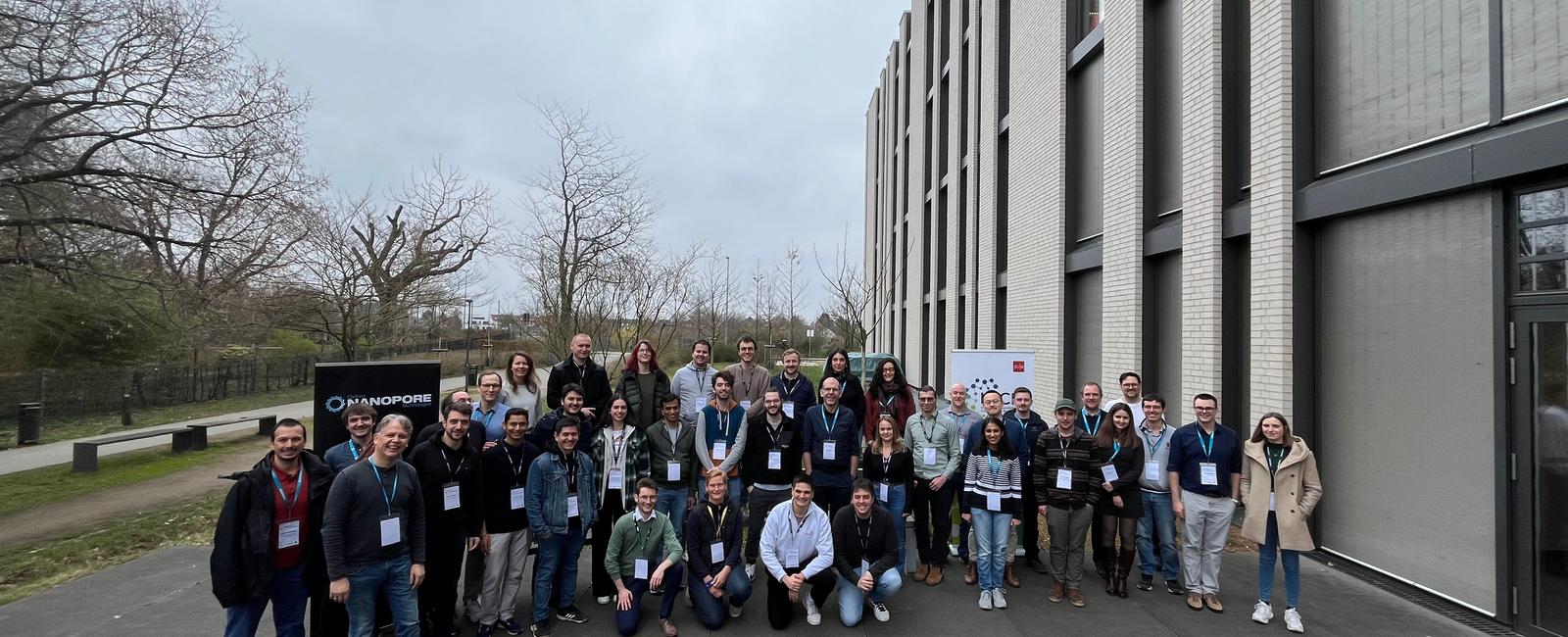The first EPI2ME Hackathon

It hasn’t been long since we held the inaugural EPI2ME hackathon in Mainz, Germany on the 4th March. The event was co-organised by Oxford Nanopore Technologies and we enjoyed it so much that we intend to host many more in the future. Look out for upcoming announcements if you want to get involved!
The event was also co-hosted by Professor Dr. Susanne Gerber from the Computational Systems Genomics Group at the Institute of Human Genetics, University Medical Center Mainz, who contributed her fantastic expertise in the analysis of Oxford Nanopore RNA sequencing data.
During the event, co-organizers Stefan Pastore and Andre Holzer also did an excellent job of keeping everyone engaged, informed and on-mission.
The themes of the event were building high quality bioinformatics workflows, integration into EPI2ME and unleashing real-time long-read analytics. We gathered scientists from around Europe and as far as the USA to talk bioinformatics, dashboards, Nextflow and more over the course of a week.
Preparing the canvas
Before the co-organisers had the opportunity to introduce their work, and prior to any teams being formed, we — the attending members of the EPI2ME team and other members from ONT — presented on a range of topics, focussing on sharing information about our process and best practices for authoring workflows.
Firstly there were general introductions to Nanopore sequencing and analysis solutions, and afterwards we elaborated on the EPI2ME software universe, describing all our workflows, our Desktop Application and the scalability of the out-of-the-box workflows we equip our customers with.
Then we moved onto workflow development, highlighting key considerations when writing a workflow, as well as a description of how to integrate workflows into EPI2ME with the least effort possible.
We also provided an insight into wf-template, our entry point to best practice workflow development, and how this can be used in the context of the Hackathon to speed up efforts!
Things only got more technical as the morning went on, specifically with a presentation about how we balance speed of execution, resilience and complexity within the design of our workflows. In particular, we covered how we tackle design issues during the development of high-performance workflows using our popular wf-human-variation project as an example.
In the afternoon, we re-focussed on one of the overall themes of the event - real time analysis - and gave a presentation and insights into how real time has been implemented in wf-metagenomics using Nextflow, starting with easy to follow examples and moving on to more difficult ones.
Whilst it was a lot to take in, we really hope that everyone who attended got a flavour of how and why we do things. We’re positive that we shared some good tips for writing maintainable, high-performance, real-time analysis pipelines that integrate with the EPI2ME ecosystem and Desktop Application.
Setting the scene
During the hackathon, the participants were given the opportunity to contribute to one of two different projects:
- RT-metagenomics: a 16S rRNA subworkflow. A pipeline from Urban et al. 2021, presented to attendees by Andre Holzer, in which nanopore long reads are used to monitor freshwater microbial communities by profiling their taxonomy through 16S rRNA gene amplicons.
- NanopoReaTA - Nanopore Real-Time Transcriptional Analysis Tool. A workflow from Wierczeiko et al. 2023, presented to participants by Stefan Pastore and Anna Wierczeiko, as a real-time analysis toolbox for cDNA and direct RNA-sequencing data from ONT with an intuitive dashboard, aimed at simplifying analyses such as differential expression profiles between conditions.
So, we had two different applications, two distinct pipelines but one common goal: harness the built-in advantages of Oxford Nanopore Technologies sequencing devices to perform real-time analysis. Naturally, participants split up into two main teams with the aim of developing the workflow to follow best practices, integrate with EPI2ME, and enhance the real-time aspects of the workflows especially in regards to visualisation.
Sketching the workflows
At the end of three days, only one of the workflows had made it into EPI2ME but a massive amount of work had gone in to improving everything from the overall architecture of the pipelines, down to the dockerisation of the tools they rely on, documentation, configuration and of course enhancements to the real time dashboards they produced.
One of the themes of the talks on the first day was that good workflows are well maintained, living projects that are always gradually evolving. We are certain that with another push the two teams will arrive at the goal of a maintainable, distributable bioinformatic tool that ‘just works’ when run in EPI2ME.
Admiring the results
The hackathon allowed participants to come together and share ideas, experience, anecdotes and perspectives on how to use Nextflow, Oxford Nanopore software and devices, and more. In addition, EPI2ME team members were on hand throughout to offer guidance and the odd bit of debugging — we look forward to seeing many of you at London Calling!
This has been a great experience for us, and we hope the same can be said for all the participants and the organisers who we are very grateful to. During the event we also had the opportunity to hear feedback from the community about our products, and we’ll be incorporating much of this as we go forward.
Once again, watch out for the next hackathon announcement and don’t miss your opportunity to get involved!
Andrea Talenti, Natalia Garcia, Tom Rich
Join us on Tuesday 21st May 2014 in person at Old Billingsgate to take part in one of our pre London Calling workshops:
From single cells to whole genomes: nanopore data analysis - £225.00 + VAT In this one-day practical workshop, attendees will be introduced to Oxford Nanopore’s EPI2ME workflows for single cell transcriptomics, human whole genome genetic variation (SNP, indel, structural variation, methylation, CNVs and STRs) and metagenomics.
Advanced workshop - bioinformatics challenge - £225.00 + VAT An advanced event where attendees will participate in bioinformatics challenges to develop (EPI2ME compatible) workflows for the analysis of Oxford Nanopore sequence data. The event is intended for bioinformaticians and coaching in core technologies will be provided.
https://nanoporetech.swoogo.com/lc24
Share
Table Of Contents
Related Posts
Information

